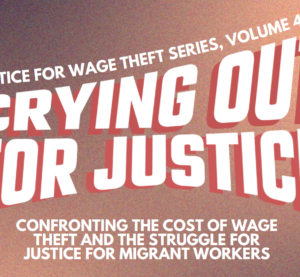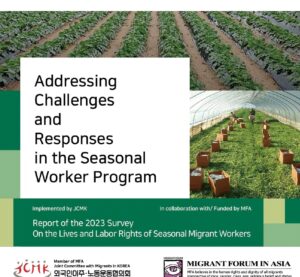Appeal 5: Measures for Addressing Wage Theft Affecting Millions of Migrant Workers in the Times of COVID-19
— November 17, 2020On the 1stof June 2020, a large coalition of civil society organizations and trade unions launched an appeal to governments to establish an “Urgent Justice Mechanism” that addresses the plight of millions of migrant workers whose wages have been unjustly withheld by their employers. Subsequent appeals called on the international community, especially the UN system, and the private sector to respond with urgency to the situation, each within the remit of its specialization, to facilitate access to justice for migrant workers and ensure compensation for the wage theft experienced by them in the wake of the current COVID-19 pandemic.
Despite the issue gaining great visibility among policy makers and generating meaningful debates and interest, little tangible progress has been made in practice to effectively diminish the great burden on the migrant workers and the indignity they are suffering. Five months after the initial call, as the pandemic continues to wreak havoc across the globe, workers continue to return, nameless and faceless, to their countries of origin without their hard-earned wages and benefits.
Now more than ever before, we renew our call on the countries of origin and the countries of destination to honour their commitment to respect, protect and fulfill the rights of migrant workers, taking immediate and practical measures to remedy wage theft and to ensure justice for affected migrant workers. For decades, wage theft has been a perennial issue for migrant workers (regardless of status) who often lack the wherewithal to access the justice mechanism to claim their dues; the COVID-19 pandemic has exacerbated the scale of wage theft against migrant workers in the context of cancelled contracts, high unemployment and forced repatriation.
We urge the countries of origin and the countries of destination to make available disaggregated data collected in the course of addressing wage theft in order to fully assess the exacerbation of the crime in the time of COVID-19 and to guide and assist the migrant workers in their efforts to recover their statutory dues.
In line with this, the measures below offer a number of concrete and tangible steps countries must immediately take in order to effectively address wage theft:
Countries of Origin
With repatriations happening at such an unprecedented scale, countries of origin have a fundamental role to play in ensuring repatriations and reintegration take place in safety, dignity and in the respect of migrant workers’ rights. This has never been more important.
First, document and do so accurately: One of the greatest barriers to addressing the cases of wage theft is the lack of a rapid, systematic collection and registration of information. In the rush to repatriate, neither countries of origin nor the countries of destination have been able to successfully capture the scale of the phenomenon of wage theft experienced by migrant workers. Cases of wage theft continue to be under-reported and remain unaddressed: there is a lack of official, reliable documentation that is key to prove migrant workers’ cases. To this end, missions of countries of origin are urged to put in place robust and easily accessible reporting systems to document whether migrant workers have been paid their due wages and benefits upon termination of their employment contract. To document accurately, missions should set up an online complaints mechanism, a walk-in option, and a 24 hour hotline.
Importantly, migrant workers must be allowed to file a grievance even in the absence of formal employment documentation, as the employer may have refused to provide it.
Second, lighten the burden of accessing justice: Collection of documentation must be accompanied by practical actions. Missions of the countries of origin must intervene to facilitate power of attorney procedures prior to initiating any return procedures for those workers who have not received their due wages or benefits. This will ensure that workers are able to access justice even after their return to their countries of origin. Where workers prefer to remain in the country of destination until their cases are resolved, missions should provide workers with the necessary assistance.
Countries of origin must set up booths at local airports and quarantine facilities to give returning workers the opportunity to register claims upon arrival to the country of origin.
Once migrant workers have returned, countries of origin must ensure that they continue to have the opportunity to come forward and register their claims and grievances, for free. To facilitate this, countries of origin must rapidly set up platforms where workers can lodge online complaints and also put in place hotline numbers that workers can call on any day to learn about how to come forward and register their claims for wage theft. Migrant workers must be provided regular and prompt updates on the progress and the outcome of their claims against wage theft.
Third, inform and empower: to enable the migrant workers to effectively claim their rights, the state must use all means of communication available including public and social media, to inform them of the mechanisms through which they can claim their rights and register their grievances.
Countries of Destination
To avoid massive wage theft becoming the legacy of the COVID-19 pandemic, countries of destination must exercise leadership and embrace innovation to tackle this problem until it is eradicated. The measures below are but a few examples of how countries of destination can intervene to guarantee justice for migrant workers who were employed in their territories.
First, Build Bridges of Trust: Many of the most vulnerable migrant communities have been marginalized by societal and political systems for a very long time. As such, they are the most severely affected by the pandemic. Now is the right time to reach out to affected communities and build bridges. No amount of policy reforms can restore confidence in an issue which is persistent and now exacerbated in the time of Covid-19. In order to build trust, countries of destination must prioritize reaching out to migrant communities and giving them reassurance that everyone can come forward and register their grievances safely, without incurring in any legal or economic consequences. Outreach efforts must encompass all migrant workers including domestic workers and take into account their specific needs. Destination countries should create a firewall between labor law and immigration enforcement, ensuring that migrant workers can come forward without fear of retaliation, detention or deportation.
When in countries of destination, workers must be allowed to file complaints online, or directly in person at relevant ministries. The documentation requirement to file claims for stolen wages by the legal heirs of migrant workers who lost their lives during the pandemic should be simplified to avoid delay in submitting the claims for the statutory dues. Workers or their families should be received with dignity and respect, providing due attention to the registration of their claims. To support this, public awareness campaigns and social media must be set up, to inform migrant workers on how to file complaints and, especially, to encourage them to seek justice. This can be done in collaboration with local civil society organizations, including trade unions, that can provide a communication bridge between the governments and migrant workers. Migrant workers should be supported in taking collective action to address wage theft.
Second, where justice is delayed, expedite it: Destination countries can adopt many measures to expedite the delivery of justice to migrant workers. The process to expedite justice begins by ensuring that free or accessible legal assistance is made available to all migrant workers regardless of their legal status (e.g. documented or undocumented) and by setting up fast track labor courts and mediation mechanisms that can decide swiftly and justly on cases of wage theft faced by migrant workers. Countries of destination should be prepared to set up specialized funds to compensate workers for their unpaid wages and benefits in advance of recouping these sums from employers, to ensure justice is expedited. Destination countries should also consider allowing migrant workers to stay legally in the country until their claims are adjudicated. As an added measure, returnees migrants should be given the opportunity to submit legal claims against employers in the missions of the countries of destination in which they worked, this should be a sufficient measure to initiate a legal inquiry.
The PDF version of the appeal is available at the following link:
Appeal 5 Measures for Addressing Wage Theft Affecting Millions of Migrant Workers in the Times of COVID-19





